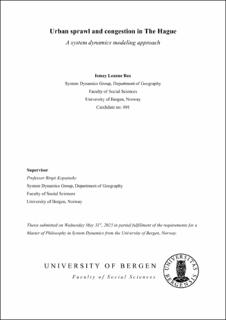Urban Sprawl and Congestion in The Hague: A System Dynamics Modeling Approach
Master thesis
Permanent lenke
https://hdl.handle.net/11250/3071224Utgivelsesdato
2023-06-02Metadata
Vis full innførselSamlinger
- Master theses [140]
Sammendrag
Urban sprawl and congestion have significant detrimental effects on society and on the environment (Hennig, et al., 2016; OECD, 2018), and the phenomenon is regarded as a major challenge for urban Europe (Uhel, 2006). This work uses System Dynamics as a modeling tool to explain the interrelationships of the various mechanisms that are part of the underlying structure which causes urban sprawl and congestion in the Dutch region The Hague. Besides providing an understanding of the processes involved as drivers of urban sprawl and congestion in the The Hague region, this work further aims to explore some basic mobility-oriented policy options that might alleviate the problem. In order to reduce urban sprawl and congestion road network development should be adjusted so that it does not favor peripheral urban areas over central urban areas with regard to their relative attractiveness, home construction and consequent housing availability. Of equal importance is the competitiveness of shared modes of transport relative to private modes of transport when concerning congestion and especially car-dependency.
